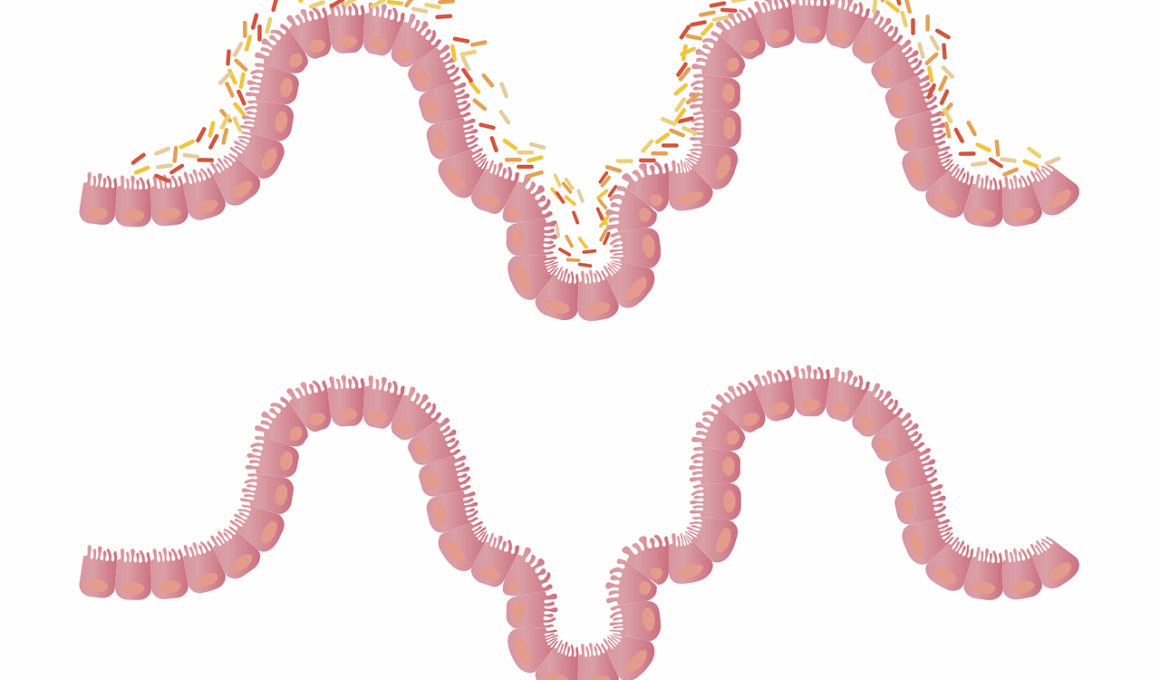Tracking Gut Health Through Nutrition for Functional Fitness
Many athletes and fitness enthusiasts are increasingly focusing on the connection between gut health and overall performance. Nutrition plays a pivotal role in shaping gut microbiota, which in turn influences how efficiently we train. When engaging in functional fitness, metabolic challenges arise that require efficient nutrient breakdown for energy. Incorporating fiber-rich foods, such as fruits, vegetables, and whole grains, helps foster a diverse gut microbiome. Consequently, this diversity can enhance the body’s ability to absorb nutrients, leading to better performance. Furthermore, probiotic-rich foods, like yogurt and kefir, can support gut health, reducing inflammation and optimizing recovery. By tracking what you eat and how your gut responds, you can make informed choices that enhance your functional training outcomes. Using mobile applications to monitor nutrition can be greatly beneficial in maintaining your dietary goals while supporting gut health. Always try to consume a variety of foods to ensure that your gut flora thrives. Acknowledging the link between gut health and performance can empower you to make necessary adjustments to your diet that sufficiently support your fitness regimen.
Becoming aware of your gut health is essential, especially for functional fitness enthusiasts. Understanding how different foods affect your gut can help enhance performance. For instance, excessive sugar can lead to dysbiosis, an imbalance in gut flora, which may hinder recovery and performance. To track your gut health effectively, consider maintaining a food diary. In this diary, note what you eat along with any digestive symptoms that arise. This way, you can identify potential trigger foods and eliminate them from your diet. Consuming fermented foods on a regular basis can introduce beneficial bacteria and improve gut health. Additionally, hydration is critical for functioning as it aids digestion and nutrient transport. Adequate water intake supports optimal enzymatic activity within the digestive system. It is also beneficial to incorporate prebiotic foods that can catalyze the growth of beneficial gut bacteria, thus contributing to your overall fitness. Taking these steps will not only aid your gut health journey but also ensure that you are getting the most out of your functional training efforts. Embrace these practices to help bolster your performance and recovery.
Essential Nutrients for Gut Health
Nutrients play a vital role in maintaining gut health which, in turn, supports functional fitness. Focus on consuming a variety of foods that provide essential vitamins and minerals. For instance, Omega-3 fatty acids found in fish, flaxseeds, and walnuts can help reduce inflammation and support gut lining integrity. Furthermore, antioxidants from berries and leafy greens can aid in mitigating oxidative stress that may occur during intense workouts. Regular consumption of polyphenols, found in coffee, tea, and dark chocolate, can also promote gut health by fostering beneficial bacteria. Additionally, diverse protein sources, including lean meats, legumes, and plant-based options, ensure you meet your daily nutritional requirements without compromising gut health. Specific vitamins, such as B vitamins from whole grains, will fuel your workouts and enhance recovery. Before making drastic dietary changes, it may be helpful to consult with a nutritionist or a dietitian. Tracking these nutrients daily can help you tailor your diet based on individual needs and training objectives. In summary, investing time in understanding which nutrients benefit your gut can lead to improved overall performance in functional training.
To optimize gut health for functional fitness, everyone should approach meal planning thoughtfully. First, consider integrating a balance of macronutrients: carbohydrates, proteins, and fats, ensuring that your meals are complete and nutritious. Carbohydrates provide energy for workouts, while proteins support muscle recovery and growth. Healthy fats offer anti-inflammatory benefits and are essential for absorbing fat-soluble vitamins. Tracking food intake using an application can help simplify this process and ensure that you meet your macronutrient goals. Moreover, planning meals ahead of time enables you to prepare nutrient-dense dishes full of gut-friendly ingredients. During the preparation process, be mindful of food pairings, as some combinations can enhance or inhibit nutrient absorption. Moreover, avoid ultra-processed foods that may negatively impact gut health and contribute to inflammation. Instead, prioritize whole and minimally processed foods when understanding the relationship between nutrition and functional fitness. As you establish a routine, experiment with flavors and textures to sustain enjoyment and adherence. Improving gut health is a journey, requiring consistency and commitment, but the benefits are undoubtedly worthwhile for anyone dedicated to functional fitness.
Understanding Digestive Responses
Not all foods affect everyone the same way, making understanding digestive responses pivotal for functional training. Each person’s gut microbiome is unique, and dietary choices play a significant role in shaping that individuality. For instance, some individuals may experience bloating or discomfort after consuming certain foods, while others may not. It’s crucial to pay attention to how different foods impact your digestion and overall performance. This critical self-awareness can guide your decisions about which foods to include in your diet. Using food and symptom tracking can help reveal patterns that inform your nutritional choices. Moreover, it’s valuable to test foods in isolation, giving your body time to adapt before introducing other variables. Everyone may have different reactions to the same foods, showcasing the importance of listening to your body. Additionally, pay attention to the body’s signal of hunger and fullness as these are essential for not overeating. Focusing on proper portion sizes can help alleviate digestive distress, thus supporting your functional fitness goals. Invest time in understanding your digestive responses to fine-tune your nutrition strategy effectively.
Incorporating a balanced approach to gut health can significantly improve your functional fitness journey. Aim to manage stress levels, as stress can disrupt gut homeostasis and negatively impact performance. Regular physical activity itself can boost gut health, enhancing microbial diversity and promoting a healthy gut environment. Furthermore, ensure you’re getting adequate sleep, as this is essential for recovery and maintaining a balanced gut microbiome. Sleep deprivation can affect how well your body processes nutrients and leads to inflammation, hampering fitness goals. Prioritizing self-care activities and relaxation techniques can help manage stress. On the nutrition front, experimenting with new recipes can make healthy eating enjoyable and more sustainable. Keeping meals interesting may encourage consistent healthy eating habits that nurture the gut. Additionally, involving social aspects of meals, like dining with friends and family, adds enjoyment and affects dietary habits positively. Remember, consistency is vital in both nutrition and fitness. By proactively addressing all aspects of health, including emotional well-being alongside nutrition, you can create a more holistic strategy that supports long-term functional fitness success. Your gut health is an investment in overall performance.
Conclusion: The Path to Optimal Gut Health
The journey to optimal gut health through nutrition is pivotal for those focused on functional fitness. Taking an individualized approach, monitoring your dietary intake and its effects on gut health, is fundamental. This may include testing different foods, maintaining a food diary, and tracking symptoms related to digestion. Such diligence can reveal insights crucial in tailoring a functional training regimen. Moreover, a focus on nutrient timing can enhance the impact of your dietary efforts, promoting optimal recovery post-workout. As you navigate the relationship between functional fitness and nutrition, remember that balance applies across all areas. Your body thrives on diversity, so indulge in a variety of nutrient-rich foods and stay fueled for daily activity. It’s also essential to check in with healthcare and nutrition professionals periodically to ensure your dietary strategy aligns with fitness goals. The ultimate aim is to foster a well-supported gut environment that participates actively in your fitness journey. Striving diligently for not just exercise but nutritional harmony will propel your health to new heights. Tracking gut health through nutrition is an ongoing process that deserves attention and commitment.
Tracking gut health through nutrition is a journey, and understanding these principles can help enhance your functional fitness performance. Incorporating these practices into your routine can create a solid foundation for a healthier gut, ultimately leading to your success in functional fitness. Embrace the changes, and don’t hesitate to share experiences with others pursuing similar goals, as it can provide motivation and accountability. Together, we can contribute to a community focused on health, fitness, and enhanced gut well-being.


